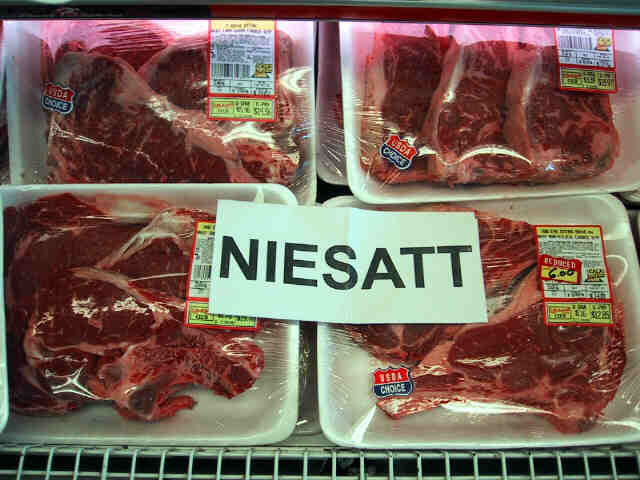
in
context
Today's consumption is undermining
the environmental resource base. It is
exacerbating
inequalities. And the dynamics of the consumption-poverty-inequality-
environment
nexus are accelerating. If the trends continue without change - not redistributing
from
high-income to low-income consumers, not shifting from polluting to cleaner
goods and
production technologies, not promoting goods that empower poor producers,
not
shifting priority from consumption for conspicuous display to meeting
basic needs -
today's problems of consumption and human development will worsen.

... The real issue is not consumption itself but its patterns and
effects.
... Inequalities in consumption are stark. Globally, the 20% of
the world's people in
the highest-income countries account for 86% of total private consumption
expenditures - the poorest 20% a minuscule 1.3%. More specifically, the
richest
fifth:
Consume 45% of all meat and fish, the poorest fifth 5%.
Consume 58% of total energy, the poorest fifth less than 4%.
Have 74% of all telephone lines, the poorest fifth 1.5%.
Consume 84% of all paper, the poorest fifth 1.1%.
Own 87% of the world's vehicle fleet, the poorest fifth less than 1%.
Runaway growth in consumption in the past 50 years is putting strains
on the
environment never before seen.
(Emphasis Added) -- Human Development Report 1998 Overview, United Nations
Development Programme (UNDP)
We consume a variety of resources and products today having moved beyond
basic
needs to include luxury items and technological innovations to try to improve
efficiency.
Such consumption beyond minimal and basic needs is not necessarily a bad
thing in and
of itself, as throughout history we have always sought to find ways to
make our lives a
bit easier to live. However, increasingly, there are important issues around
consumerism
that need to be understood. For example:
How are the products and resources we consume actually produced?
What are the impacts of that process of production on the environment,
society,
on individuals?
What are the impacts of certain forms of consumption on the environment,
on
society, on individuals?
Which actors influence our choices of consumption?
Which actors influence how and why things are produced or not?
What is a necessity and what is a luxury?
How do demands on items affect the requirements placed upon the environment?
How do consumption habits change as societies change?
Businesses and advertising are major engines in promoting the consumption
of
products so that they may survive. How much of what we consume is influenced
by
their needs versus our needs?
Also influential is the very culture of today in many countries, as well
as the media
and the political institutions themselves. What is the impact on poorer
nations and
people on the demands of the wealthier nations and people that are able
to afford
to consume more?
How do material values influence our relationships with other people?
What impact does that have on our personal values?
And so on.
Just from these questions, we can likely think of numerous others as well.
We can
additionally, see that consumerism and consumption are at the core
of many, if not most
societies. The impacts of consumerism, positive and negative are very significant
to all
aspects of our lives, as well as our planet. But equally important to bear
in mind in
discussing consumption patterns is the underlying system that promotes
certain types of
consumption and not other types.
Inherent in today's global economic system is the wasteful use of resources,
labor and
capital. These need to be addressed. Waste is not only things like via
not recycling etc;
it is deep within the system.
The U.N. statistics above are hard hitting, highlight one of the major
impacts of today's
form of corporate-led globalization.
"Over" population is usually blamed as the major cause of environmental
degradation, but
the above statistics strongly suggests otherwise. As we will see, consumption
patterns
today are not to meet everyone's needs. The system that drives these consumption
patterns also contribute to inequality of consumption patterns too.
This section of the globalissues.org web site will attempt to provide an
introductory look
at various aspects of what we consume and how.
We will see possible "hidden" costs of convenient items to society, the
environment
and individuals, as well as the relationship with various sociopolitical
and economic
effects on those who do consume, and those who are unable to consume as
much
(due to poverty and so on).
We will look at how some luxuries were turned into necessities in order
to increase
profits.
This section goes beyond the "don't buy this product" type of conclusion
to the
deeper issues and ramifications.
We will see just a hint at how wasteful all this is on resources, society
and capital.
The roots of such disparities in consumption are inextricably linked
to the roots of
poverty. There is such enormous waste in the way we consume that an incredible
amount of resources is wasted as well. Furthermore, the processes that
lead to
such disparities in unequal consumption are themselves wasteful
and is structured
deep into the system itself. Economic efficiency is for making profits,
not
necessarily for social good (which is treated as a side effect). The waste
in the
economic system is, as a result, deep. Eliminating the causes of this type
of waste
are related to the elimination of poverty and bringing rights to all. Eliminating
the
waste also allows for further equitable consumption for all, as well as
a decent
standard of consumption
A further bold conclusion is also made that elimination of so much wasted
capital
would actually require a reduction of people's workweek. This is because
the
elimination of such waste means entire industries are halved in size in
some cases.
So much labor redundancy cannot be tolerated, and hence the answer is therefore
to share the remaining productive jobs, which means reducing the workweek!
We will see therefore, that political causes of poverty are very much related
to
political issues and roots of consumerism. Hence solutions to things like
hunger,
environmental degradation, poverty and other problems have many commonalities
that would need to be addressed.
Entire volumes of research can be written on this topic so these pages
provide just an
insight to these issues!
Creating the Consumer
This section looks at the rise of the consumer and the development of the
mass
consumer society. While consumption has of course been a part of our history,
in the last
100 years or so, the level of mass consumption beyond basics has been exponential
and
is now a fundamental part of many economies. Luxuries that had to be turned
into
necessities and how entire cultural habits had to be transformed for this
consumption is
introduced here.
Children as Consumers
A stark example of this increasing consumption and its associated impacts
is the use and
promotion of consumption by children. Kid's markets are enormous and there
are many
products and foods geared towards children. Parents on the one hand have
a hard time
raising children; while on the other hand, kids are being increasingly
influenced by
commercialism.
Effects of Commercialized Consumption
Because consumption is so central to many economies, and even to the current
forms of
globalization, its effects therefore are also seen around the world. How
we consume, and
for what purposes drives how we extract resources, create products and
produce
pollution and waste. Issues relating to consumption hence also affect environmental
degradation, poverty, hunger, and even the rise in obesity that is nearing
levels similar to
the "official" global poverty levels. Political and economic systems that
are currently
promoted and pushed around the world in part to increase consumption also
lead to
immense poverty and exploitation. Much of the world cannot and do not consume
at the
levels that the wealthier in the world do. Indeed, the above U.N. statistics
highlight that
very sharply. In fact, the inequality structured within the system is such
that as Richard
Robbins says, "some one has to pay" for the way the wealthier in the world
consume.
Sugar

In this section, we look at the example of sugar consumption; how it has
arisen (as it
was once a luxury, now turned into a "necessity"). We look at things like
how it affects
the environment; the political and economic drivers in producing sugar
(for example,
historically, sugar plantations encouraged slavery); its health effects
today; its relation
to world hunger (as land used to grow sugar and related support, for export,
could be
used to grow food for local consumption); and so on. As we will also see,
it is an example
of a "wasteful" industry. That is, so many resources go into this industry
compared to
what might be needed. This wastes labor, wastes capital and uses up many
resources.
Beef

Beef, as sugar, is another vivid example of enormous waste, in resources,
environmental
degradation, in contributing to world hunger, poverty etc. For example,
more than one
third of the world's grain harvest is used to feed livestock. Some 70 to
80% of grain
produced in the United States is fed to livestock. A lot of rainforest
in the Amazon and
elsewhere are cleared for raising cattle -- not so much for local consumption,
but for fast
food restaurants in America and elsewhere. There are enormous related costs
of what is
an "inefficient" means of production. A more realistic estimate of the
real cost of a
hamburger was put at $35! As with sugar, beef was a luxury turned into
an everyday
item. Like sugar, it is also an example of how people's tastes are influenced
and how
"demands" can be created (or very much expanded), rather than meeting some
"natural"
demand.
Bananas

The banana industry in Latin America and the Caribbean also touches many
other issues.
Rainforest destruction is one effect of the banana industry. Dependent
economies is
another, where bananas are grown not to feed local people and meet their
demands, but
to create exports for Europe and America. The recent trade disputes between
those two
regions have received the most attention. However, the focus of the debate
is limited. It
continues to leave both dependent Latin American nations, and the Caribbean
nations in
poverty and hunger, while Latin American nations, large multinational American
banana
corporations and the American government seek to destroy the Caribbean
banana
economy, via the World Trade Organization, in order to gain dominant access
to the
European markets. So many resources are poured into the banana industry,
and like the
sugar and beef examples, there is a lot of unnecessary use of resources
that could
otherwise be freed up to help local people in a way that is also less degrading
to the
surrounding environment.
Wasted Wealth, Wasted Capital, Wasted Labor, Wasted Resources
We are beginning to get just a hint of how wasteful our societies are.
Sugar, beef, and
bananas are just the tip of the iceberg in terms of examples of wasted
industry and
waste structured within the current system. Not only are certain wasteful
job functions
unnecessary as a result, but the capital that employs this labor is therefore
a wasteful
use of capital. As a result, we see waste and misuse of the environment,
as well as social
and environmental degradation increasing. Our industries may be efficient
for
accumulating capital and making profits, but that does not automatically
mean that it is
efficient for society. However, with such "wasted labor" what do we do?
We can't have
such an enormous idle labor force, right? Well, as J.W. Smith points out,
we should share
the remaining jobs. This would also reduce our workweek. Something technocrats
have
kept promising us in rhetoric only!
Mathematics of Wasted Labor -- an Example
With kind permission from J.W. Smith, a part of the conclusion to Part
I of World's Wasted
Wealth II (Institute for Economic Democracy, 1994) has been reproduced
on this page.
That part is titled The Mathematics of Wasted Labor. It is a vivid example
of wasted and
unnecessary labor using the United States as the case study. While the
book was written
back in 1994 and the numbers, facts and estimates are hence based on data
from the
early 1990s, the pattern and examples shown here are still very valid.
His calculations
suggest that with the elimination of wasted labor in the U.S. and sharing
the remaining
productive jobs between all those who can work, workers would need to work
just 2.4
days per week!
Text by Anup Shah
